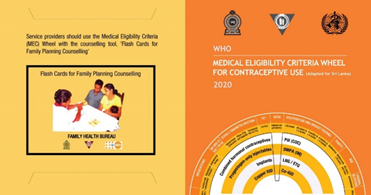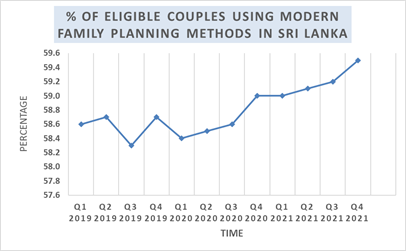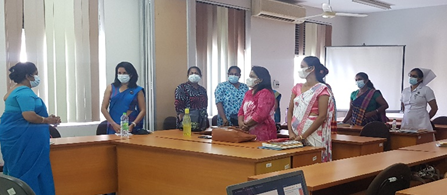Globally, there were 1.1 billion women in need of family planning out of 1.9 billion women in the reproductive age group (15-49 years) in 2019. Of them only, 842 million were using contraceptive methods, leading to 270 million with unmet need for contraception globally. Global data related to progress on the Sustainable Development Goal (SDG) indicator 3.7.1, show the proportion of family planning needs satisfied by modern family planning methods has been stagnated around 77% during 2015-2020 period [1].
The Sri Lanka Demographic Health Survey (2016) reports a contraceptive prevalence rate as 65%, with 54% of users using a modern method. COVID-19 pandemic had caused unprecedented impact on all health services and family planning services is no exception. Three rounds of Pulse Survey on continuity of essential health services conducted by World Health Organization (WHO) revealed that family planning services had been significantly impacted in approximately one third of countries. Sri Lanka also followed the global trend with 5-25% service disruptions related to family planning service delivery by the end of 2021.
WHO Sri Lanka has been a long-term partner with National Family Planning Programme of Ministry of Health, Sri Lanka, jointly with other stakeholders. The focus has been mainly on building and improving staff capacities and on introducing new tools for evidence-based decision making.
Introducing new tools to facilitate contraceptive- related decision making
WHO Sri Lanka supported Ministry of Health (MOH) to adopt the Medically Eligibility Criteria Wheel (MEC-Wheel) for contraceptive use developed by the WHO and disseminated the tool among more than 6000 field health staff to facilitate quality decision making on family planning method selection.

(MEC Wheel-adopted for Sri Lanka)
Building capacities of Health staff
WHO has been supporting regular capacity building of health staff on the technical updates on family planning, through an online training course on "GFMER Family Planning: Evidence-based Online Training Course”.
Moreover, WHO was involved in re-orienting family planning services to address challenges posed by COVID-19 pandemic specifically to ensure adherence to public health and social measures in family planning service delivery during the new normal period. These improvements were integrated and scaled up through training of trainer sessions and more than 100 health staff were trained annually since 2020 benefitting many public health teams in the country. With the support of all stakeholders and partners, Sri Lanka was able to sustain family planning services despite the COVID-19 pandemic and related service delivery and access issues in the pandemic.
WHO Sri Lanka supported the Ministry of Health with infrastructure and virtual communication packages to both national and district Maternal and Child Health (MCH) units . This support has reached all MCH units in 26 health districts and has provided the much-needed platform to continue national- provincial coordination and ensured staff capacity building and continuous monitoring of family health programme including a family planning service delivery during the pandemic as well as during the current economic crisis with travel limitations.
We are newly appointed Public health Nursing Sisters. Although Family planning was included in our Post Basic Training, when we started working in the field, we faced many difficult situations. So, it is important that we get this type of regular trainings so that we can sort out our implementation challenges and provide client friendly service. We thank Family Health Bureau and WHO in providing these technical updates
Trainee from Anuradhapura

(Source: e-RHMIS, FHB, MOH)
South-South Learning exchange
Shaping the research agenda is one of the WHO core functions. Learning through the systematic exchange of knowledge, skills and know-how of successful initiatives between countries is considered to result in effective and positive development outcomes. South-South learning exchange (SSLE) has been introduced under the Family Planning Accelerator project to strengthen national family planning programmes and enable countries to reach their SDG goals 3 and 5.
Using a systematic approach, Nepal and Sri Lanka embarked on SSLE to expand and accelerate rights-based family planning services using a health system strengthening approach. The conversation between the two countries was initiated in January 2020. Despite COVID-19 pandemic and other challenges, the SSLE conversations continued through a virtual modality. Following multiple exchanges with and between countries, the two countries have moved on and started implementation of the learnings since December 2021.
Sri Lanka has completed the piloting of e- logistic management system (e-LMIS) for family planning commodities and has scaled it up to the district level and now is in the process of extending the system down to 354 Medical Officer of Health areas. The use of technology is being explored to improve real-time stock monitoring and resupply planning and to address selective stockouts of contraceptives at the district level proactively. Further, Sri Lanka has taken action to introduce additional data elements into the e-Reproductive Health Information Management System (e-RHMIS) to address the gaps identified during the SSLE. This success story has been published in a peer reviewed journal for wider reach [2].Future steps
WHO will continue to support Ministry of Health to sustain its family planning services and good practices through the new normal period and in the present economic crisis by generating local evidence through rapid assessments, service delivery evaluation and strengthening norms and standards.

Related Links:
Improving access to quality family planning services in Nepal and Sri Lanka: insights from a South-South learning exchange: https://gh.bmj.com/content/7/5/e008691
Fact sheet: https://www.who.int/news-room/fact-sheets/detail/family-planning-contraception
Global pulse survey: https://apps.who.int/iris/bitstream/handle/10665/173585/9789241549257_eng.pdf?sequence=1
